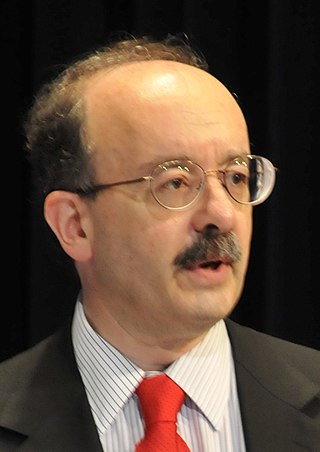
Amory Bloch Lovins is an American writer, physicist, and former chairman/chief scientist of the Rocky Mountain Institute. He has written on energy policy and related areas for four decades, and served on the US National Petroleum Council, an oil industry lobbying group, from 2011 to 2018.

Energy development is the field of activities focused on obtaining sources of energy from natural resources. These activities include the production of renewable, nuclear, and fossil fuel derived sources of energy, and for the recovery and reuse of energy that would otherwise be wasted. Energy conservation and efficiency measures reduce the demand for energy development, and can have benefits to society with improvements to environmental issues.
Eco-capitalism, also known as environmental capitalism or (sometimes) green capitalism, is the view that capital exists in nature as "natural capital" on which all wealth depends. Therefore, governments should use market-based policy-instruments to resolve environmental problems.

RMI is an organization in the United States co-founded by Amory Lovins dedicated to research, publication, consulting, and lecturing in the field of sustainability, with a focus on profitable innovations for energy and resource efficiency. RMI was established in 1982 and has grown into a broad-based institution with over 600 staff and an annual budget of $120+ million. RMI's work is independent and non-adversarial, with an emphasis on market-based solutions.

In 1976, energy policy analyst Amory Lovins coined the term soft energy path to describe an alternative future where energy efficiency and appropriate renewable energy sources steadily replace a centralized energy system based on fossil and nuclear fuels.

Renewable energy in Germany is mainly based on wind and biomass, plus solar and hydro. Germany had the world's largest photovoltaic installed capacity until 2014, and as of 2021 it has over 58 GW. It is also the world's third country by installed total wind power capacity, 64 GW in 2021 and second for offshore wind, with over 7 GW. Germany has been called "the world's first major renewable energy economy".

Renewable energy commercialization involves the deployment of three generations of renewable energy technologies dating back more than 100 years. First-generation technologies, which are already mature and economically competitive, include biomass, hydroelectricity, geothermal power and heat. Second-generation technologies are market-ready and are being deployed at the present time; they include solar heating, photovoltaics, wind power, solar thermal power stations, and modern forms of bioenergy. Third-generation technologies require continued R&D efforts in order to make large contributions on a global scale and include advanced biomass gasification, hot-dry-rock geothermal power, and ocean energy. As of 2012, renewable energy accounts for about half of new nameplate electrical capacity installed and costs are continuing to fall.

Winning the Oil Endgame: Innovation for Profits, Jobs and Security is a 2005 book by Amory B. Lovins, E. Kyle Datta, Odd-Even Bustnes, Jonathan G. Koomey, and Nathan J. Glasgow, published by the Rocky Mountain Institute. It presents an independent, transdisciplinary analysis of four ways to reduce petroleum dependence in the United States:

Fossil fuel phase-out is the gradual reduction of the use and production of fossil fuels to zero, to reduce deaths and illness from air pollution, limit climate change, and strengthen energy independence. It is part of the ongoing renewable energy transition, but is being hindered by fossil fuel subsidies.

Brittle Power: Energy Strategy for National Security is a 1982 book by Amory B. Lovins and L. Hunter Lovins, prepared originally as a Pentagon study and re-released in 2001 following the September 11 attacks. The book argues that the U.S. domestic energy infrastructure is very vulnerable to disruption, whether by accident or malice, often even more so than US technology is vulnerable to disruption of the imported oil supply. According to the authors, a resilient energy system is feasible, costs less, works better, and is favoured in the market, but is rejected by U.S. policy. In the preface to the 2001 edition, Lovins explains that these themes are still very current.
The environmental benefits of renewable energy technologies are widely recognised, but the contribution that they can make to energy security is less well known. Renewable technologies can enhance energy security in electricity generation, heat supply, and transportation.
Energy subsidies are measures that keep prices for customers below market levels, or for suppliers above market levels, or reduce costs for customers and suppliers. Energy subsidies may be direct cash transfers to suppliers, customers, or related bodies, as well as indirect support mechanisms, such as tax exemptions and rebates, price controls, trade restrictions, and limits on market access.

100% renewable energy is the goal of the use renewable resources for all energy. 100% renewable energy for electricity, heating, cooling and transport is motivated by climate change, pollution and other environmental issues, as well as economic and energy security concerns. Shifting the total global primary energy supply to renewable sources requires a transition of the energy system, since most of today's energy is derived from non-renewable fossil fuels.

The Pickens Plan is an energy policy proposal announced July 8, 2008, by American businessman T. Boone Pickens. Pickens wanted to reduce American dependence on imported oil by investing approximately $US1 trillion in new wind turbine farms for power generation, which he believed would allow the natural gas used for power generation to be shifted to fuel trucks and other heavy vehicles with Compressed natural gas. Pickens stated that his plan could reduce by $300 billion (43%) the amount the country spends annually on foreign oil.

Policy makers often debate the constraints and opportunities of renewable energy.
Kristin Shrader-Frechette is O'Neill Family Professor, Department of Biological Sciences and Department of Philosophy, at the University of Notre Dame. She has previously held senior professorships at the University of California and the University of Florida. Most of Shrader-Frechette's research work analyzes the ethical problems in risk assessment, public health, or environmental justice - especially those related to radiological, ecological, and energy-related risks. Shrader-Frechette has received the Global Citizenship Award, and the Catholic Digest named her one of 12 "Heroes for the US and the World".

Apollo's Fire: Igniting America's Clean Energy Economy is a 2007 book by Washington State Governor Jay Inslee and researcher Bracken Hendricks. Inslee first proposed an Apollo-scale program, designed to galvanize the nation around the urgent goal of solving the environmental and energy crisis, in the Seattle Post-Intelligencer in 2002. Eventually Inslee co-authored Apollo's Fire, in which he says that through improved Federal policies the United States can wean itself off of its dependence on foreign oil and fossil fuel, create millions of green-collar worker jobs, and stop global warming. Along these lines, he has been a prominent supporter of the Apollo Alliance.

Fossil fuel subsidies are energy subsidies on fossil fuels. They may be tax breaks on consumption, such as a lower sales tax on natural gas for residential heating; or subsidies on production, such as tax breaks on exploration for oil. Or they may be free or cheap negative externalities; such as air pollution or climate change due to burning gasoline, diesel and jet fuel. Some fossil fuel subsidies are via electricity generation, such as subsidies for coal-fired power stations.

World energy supply and consumption refers to the global primary energy production, energy conversion and trade, and final consumption of energy. Energy can be used in various different forms, as processed fuels or electricity, or for various different purposes, like for transportation or electricity generation. Energy production and consumption are an important part of the economy. This topic includes heat, but not energy from food.














